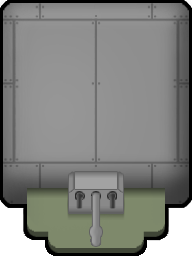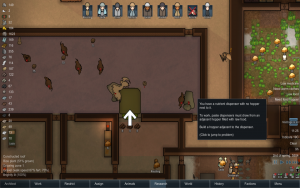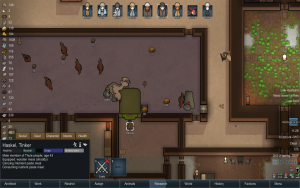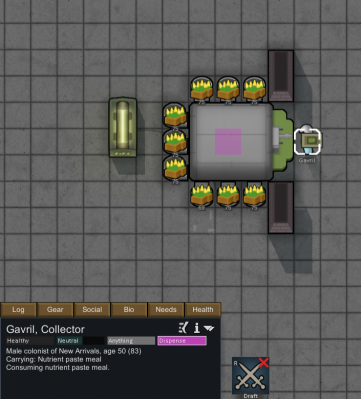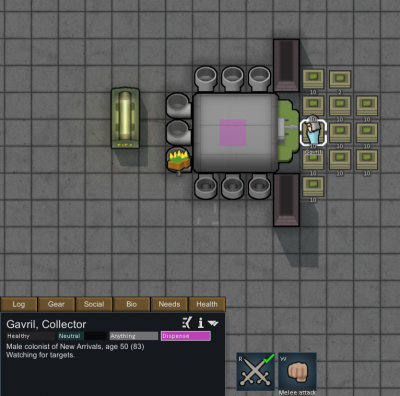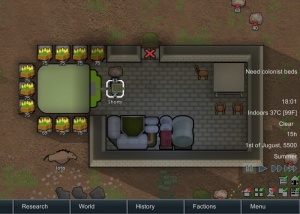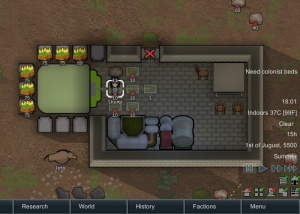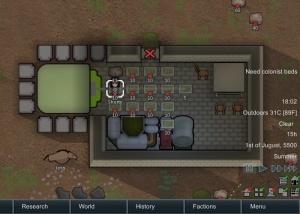Nutrient paste dispenser
| This page could use some more or updated images. You can help RimWorld Wiki by uploading images to make this page better. Note: Orange version for prisoners and integration of same. |
Nutrient paste dispenser
A machine that synthesizes edible nutrient paste from organic feedstocks placed in adjacent hoppers. It consumes less ingredients and time than any other meal production method - but nobody likes eating nutrient paste. Accepts raw food, but not rough plant matter like hay.
Base Stats
- Type
- Building – Production
- HP
- 350
- Flammability
- 50%
Building
- Size
- 3 × 4
- Minifiable
- False
- Placeable
- True
- Passability
- impassable
- Cover Effectiveness
- 75%
- Blocks Wind
- True
- Terrain Affordance
- Heavy
- Power
- -200 W
Creation
- Required Research
- Nutrient paste
- Skill Required
- Construction 5
- Work To Make
- 2,200 ticks (36.67 secs)
The nutrient paste dispenser is an electrical device that converts raw food placed in an adjacent hopper into nutrient paste meals.
Acquisition
The nutrient paste dispenser can be constructed with ![]() 125 Steel,
125 Steel, ![]() 3 Components in 2,200 ticks (36.67 secs) once Nutrient Paste has been researched. By default, New Arrivals start with nutrient paste available.
3 Components in 2,200 ticks (36.67 secs) once Nutrient Paste has been researched. By default, New Arrivals start with nutrient paste available.
Summary
The nutrient paste dispenser is impassible, so acts like a wall for room and temperature mechanics. It requires 200 W of power to function. Pawns interact with the dispenser from the interaction spot, the front-center tile, indicated by the circle when placed. If the front end of the machine is inside a prison cell, then only prisoners will be allowed to use it; the machine will turn orange to show this. While you can't build on the interaction spot or build an dispenser with it blocked, it can be blocked after construction by chunks, preventing use until they are hauled away.
The dispenser will create 1 nutrient paste meal for 0.3 nutrition worth of food, when placed in an adjacent hopper. Hoppers can be placed in any cardinally adjacent tile except for the interaction spot. They act like ordinary stockpile zones, so colonists will deliver food as a hauling task. Make sure to set the Priority of the hoppers to be higher than other stockpiles. Only one type of food can be placed into a hopper. Any food except hay will be used, but colonists will only load it with raw food. It will also consume corpses that placed on top of hoppers but pawns will not intentionally load hoppers with them and it is nutritionally inefficient compared to butchering first.
Colonists or prisoners will automatically use the dispenser when hungry, assuming it is powered, accessible, and has enough food. No work bills or tasks can be performed at the machine, and no skills are necessary to use it. Colonists with the "Warden" task can also deliver nutrient paste from an external machine to prisoners. Animals will not use the dispenser will eat the produced meals if they are fed to them by other means. In order to produce meals for storage or animals, you must manually manipulate a pawn - see below for details.
It is possible to force other foods on top of a hopper by taking it to a pawn's inventory and then manually dropping it in front of the hopper. This may be considered an exploit.
Nutrient paste
Nutrient paste converts 0.3 nutrition of raw food to 0.9 nutrition, tripling it. But when consumed, nutrient paste gives a -4 mood penalty ("Ate awful meal"), though this is better than eating raw food. Pawns will always prefer a more tasty food, so unless their Food Restriction is specifically assigned to "Paste" (located at the top of a colonist's Health tab), they will only use the dispenser if no better option is available.
Use of human or insect meat in a nutrient paste meal will still apply their regular moodlets.
Analysis
At 300% nutritional efficiency, Nutrient paste is the most efficient way to prepare a meal. Compared to the next best method, simple and fine meals with 180% efficiency, paste gives 66.67% more food. This makes nutrient paste useful in a famine, even if you don't plan to use it indefinitely. In addition, no cooking is necessary. There's no risk of food poisoning, and it can save a lot of time off a cook's hands - cooking is often a full time job in large colonies. Overall, a nutrient paste dispenser can accelerate the development of a colony, and may be necessary in an extreme biome like ice sheet.
However, nutrient paste meals give a -4 mood debuff, which ends up being -9 net mood compared to fine meals. It is advised to not give nutrient paste to pawns with a trait that gives a negative modifier to mental break threshold, because they can push a pawn over the edge. Because pawns prefer normal meals over nutrient paste, you can set restrictions to prevent normal pawns from consuming all of the good meals and leaving none to the volatile ones.
The mood penalty is negated if the colonist eating it has a precept "Eating Nutrient paste" as "Don't mind" for their Ideoligion![]() .
.
The paste dispenser also makes it a lot easier to keep animals that need to be fed by the colonists (such as dogs and grazing animals off the growing season). Feeding animals with paste requires occasional micro-management to create meal reserves, since animals cannot trigger the dispenser themselves.
Manually producing meals
Using the paste dispenser is an automatic task that cannot be explicitly triggered. It is still possible to make a pawn produce as many meals as you want, until the machine runs out of raw food to process.
You need at least one pawn to be hungry enough to demand a meal. This will happen at least once per day, per pawn.
Forcing the pawn to create meals exploits the fact that a pawn stops their current action when they are drafted. We also need to keep the colonist away from any food, so they will be forced to keep producing new meals at the paste dispenser.
Method 1: using a special zone restriction (recommended)
The following method uses a 1-tile zone restriction that is placed in the middle of the dispenser. This is the easiest method for producing more than one stack of meals at a time. In detail:
- Create a new area that covers exactly 1 tile in the center of the main body of the nutrient paste dispenser (as shown in the screenshot). The exact location of this area matters, in order for the pawn to be able to path to the paste dispenser.
- When one of your colonists (it does not matter which one) becomes hungry, and is about to eat a meal, pause the game and restrict the pawn to the area created in step one. You might also have to draft and undraft the colonist so he will stop the current action. The pawn will now be unable to do anything except produce meals at the paste dispenser, due to the zone restriction he is now under. He will even be unable to grab meals that are right on top of him, including the ones he produces from the machine!
- Wait for the colonist to walk up to the paste dispenser and draw a meal from the machine. Pause the game again at this point.
- To start mass producing meals, simply draft and undraft the pawn as many times as desired. Each cycle will instantly procure another meal from the dispenser, using up some of the resources from the hoppers. The meal is not consumed by the colonist, because drafting him will make him drop the meal on the floor, where it will be out of reach (due to the zone restriction). You can hold down the draft hotkey to rapidly mass produce meals.
- When you are finished, simply undraft the pawn a final time and remove the zone restriction from him. Done.
The entire process will require no in-game time, since the game is paused all the way.
Notes:
- If you wait a little to long with pausing the game, after the pawn has produced a meal, they will move away from the dispenser and consume the meal (ignoring the zone restriction). This is not a problem: simply draft and undraft the pawn, they will drop the meal on the ground and you can resume again at step 3 above.
- Pawns may prefer to eat meals that are already made, and not use the paste dispenser in those situations, depending on several factors that are difficult to control. If you want to protect your bulk-produced meals from colonists, you have to forbid the stacks or exclude the colonists from the area they are stored in. Domesticated animals will not eat from forbidden stacks, so an exclusion zone has to be used to reserve the food for animals.
- Many pawns want to eat after getting up in the morning. This makes it easier to watch for hungry pawns if you plan to mass produce some meals.
The pawn is restricted to a 1-by-1 tile wide area which is placed in the middle of the nutrient paste dispenser. The precise location of the zone is important. The pawn will now produce meals indefinitely when drafted and undrafted in front of the dispenser (while there is material on top of the hoppers).
This is the state after all hoppers are depleted. The pawn is now surrounded by stacks of nutrient paste meals. He is still unable to eat any of them, due to the zone restriction (which can now be removed and the pawn undrafted). Note that none of the meal stacks are forbidden, because that is not necessary with this method.
Now you can have as many nutrient paste meals as your heart desires! Enough to take with you on cold journeys! Enough to make an emergency food stockpile! Enough to use as animal fodder!
Method 2: manually forbidding stacks (casual use)
If you do not want to deal with zone restrictions, you proceed as in method 1, but then you have to forbid any new meal stacks that are created, before continuing to cycle the drafting. This method is a little inconvenient if you want to produce more than a single stack of meals, or if you repeat the process regularly (eg. to produce animal food).
Version history
- Beta 19/ 1.0 - Now tinted orange when they can be used by prisoners.
